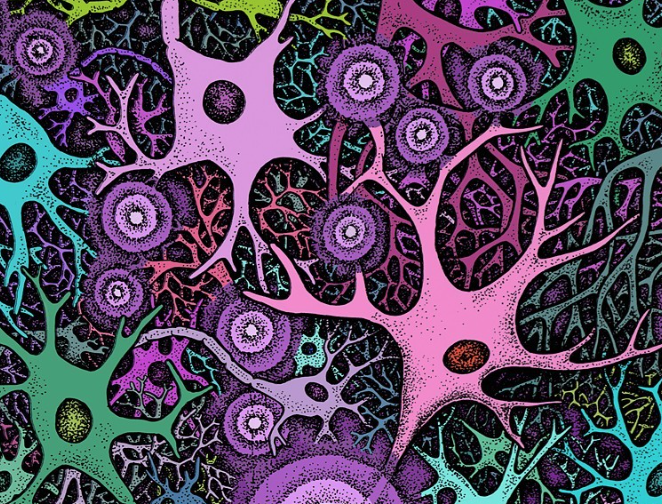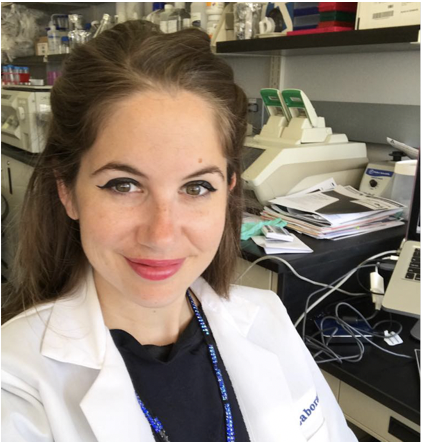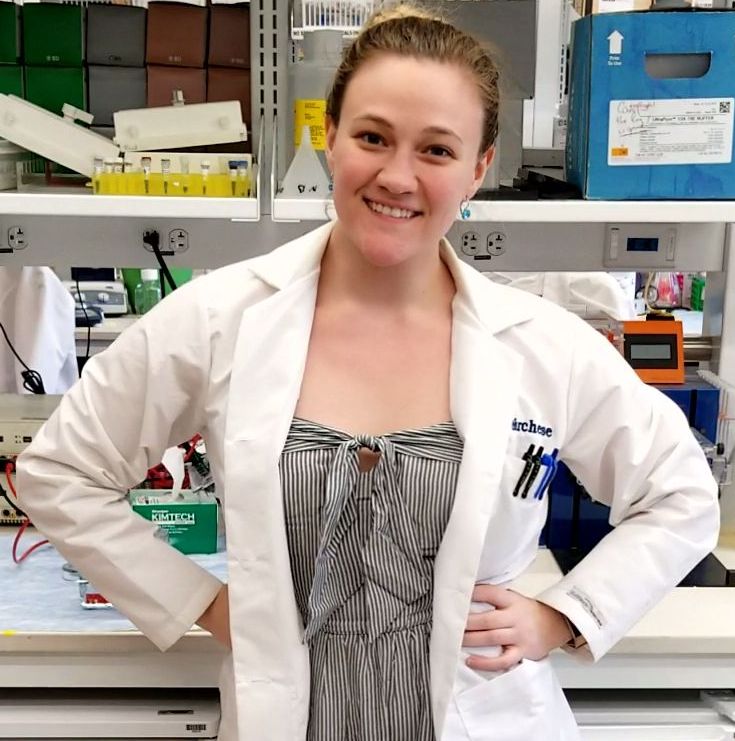Research Areas of Focus:
Transcriptomic Imputation
Transcriptomic Imputation approaches use eQTL reference data to create predictors of gene expression in specific tissues. These models may then be applied to genotype data to calculate predicted genetically regulated gene expression (GREX), and to test for associations between GREX and a trait of interest. These models may also be applied to summary statistics to translate GWAS data into GREX associations.
The Huckins Lab develops and applies these models; in particular, we focus on (1) improvement of statistical methodology underlying model creation; (2) probing spatio-temporal specificity of these models; (3) expansion to multi-omic prediction. We apply these models to psychiatric traits and disorders.
Disorders of Interest
The Huckins Lab focuses on understudied psychiatric disorders. In particular, we are interested in disorders affecting women, children, and vulnerable populations.
Eating Disorders
Eating Disorders are highly complex, dangerous, and understudied neuropsychiatric disorders. EDs have significant heritability (50-80%), in line with other psychiatric disorders, and have the highest mortality rates of any psychiatric disorders. Despite this, ED research receives ~$1 for every $70 spent on other major mental disorders.
EDs affect all genders, races, ethnic groups, and people of all ages. EDs may disproportionately affect members of the LGBTQIA community (16% of transgender college students report having an eating disorder, as do 3.5% of sexual minority women, and 2.1% of sexual minority men) and active duty personnel (~9% of women and ~7.5% of men have or develop an eating disorder during active duty).
The Huckins Lab is dedicated to addressing this dearth of ED research. Dr. Huckins has been involved in ED research since her PhD- including work on the first GWAS for Anorexia Nervosa, the first study of low-frequency variation, and the first study of transcriptomic imputation. Our work focuses on elucidating the tissues and systems involved in EDs, and studying multi-omic involvement, including gene expression, histone modifications, and microbiome involvement.
Post-traumatic Stress Disorder (PTSD)
Following a life-threatening traumatic exposure, about 10% of those exposed are at considerable risk for developing posttraumatic stress disorder (PTSD), a severe and disabling syndrome characterized by uncontrollable intrusive memories, nightmares, avoidance behaviours, and hyperarousal in addition to impaired cognition and negative emotion symptoms.
The Huckins Lab is interested in understanding the genetic basis of susceptibility/resilience to PTSD following trauma. A key focus of our group is understanding differing genetic aetiologies and risk factors for PTSD according to trauma type, in particular sexual assault.
Our analyses include a range of genetic, genomic, and multi-omic investigations into (1) predicting PTSD trajectory; (2) identifying shared and distinct genetic aetiologies for military and civilian PTSD; (3) identifying biological systems involved in PTSD using multi-omic imputation.

Contact Us
Huckins Laboratory
Laura M Huckins, Ph.D.
Assistant Professor
Pamela Sklar Division of Psychiatric Genomics
Seaver Autism Centre for Research and Treatment
Department of Psychiatry
Department of Genetic and Genomic Sciences
The MeToo Project
With the rise of the #TimesUp and #MeToo movements, it’s time for our society to talk about rape. That includes researchers and scientists.
Our studies of PTSD have shown that trauma matters. The type of trauma we experience, and the chronicity of that trauma, is key in PTSD development. To this end, we have focused many studies on PTSD following specific traumas, in particular military/combat trauma. Given the ubiquity of rape and sexual assault in our societies, and the high prevalence of PTSD (and other psychiatric diagnoses) among rape survivors, understanding these particular traumas will be vital to identifying biological mechanisms of PTSD, and resilience.
Our study has three key goals:
- Understanding the impact of rape on physical and mental health. We collate very large collections of biobank and electronic health record data to study the effects of rape/sexual assault, across the phenome. Where possible, we will construct longitudinal trajectories of physical and mental outcomes. If you work with data that might be relevant here, please get in touch!
- Identifying genetic and genomic predictors of PTSD and resilience. We use GWAS, polygenic risk score, prediXcan, and multi-omic association analyses to identify risk factors predisposing to PTSD and resilience, and membership of trajectories identified in goal 1.
- Identifying biomarkers of resilience. We are interested in recruiting a new large cohort of rape survivors- and collecting a variety of questionnaire and biomarker data. Stay tuned for information on our collection efforts!
Bias in Psychiatry
A person’s race, gender identity, sexuality, and many other intersectional factors will impact their experiences of our healthcare systems. Studies which fail to account for these biases may falsely interpret their results to infer differences between groups that are a result of structured bias rather than biological truth. Here, we define EHR ‘bias’ as influences on a variable related to the individual or system assigning that variable, rather a true description of the variable itself. Such bias may occur in EHR as a result of racism, sexism, homophobia, transphobia, among others, and may produce skewed or missing data that is not a result of individuals themselves but rather the perception of those individuals. We work to uncover, characterize and address these biases across hospital EHR systems.
This project is co-lead by Dr. Huckins and Dr. Dueñas. PIs/MDs interested in collaborating on these projects should contact either lead investigator.
Sample Recent Publications
Huckins, L. M., Dobbyn, A., Ruderfer, D. M., Hoffman, G., Wang, W., Pardiñas, A. F., … Consortium, T. S. W. G. of the P. G. (2019). Gene expression imputation across multiple brain regions provides insights into schizophrenia risk. Nature Genetics, 51(4), 659–674. https://doi.org/10.1038/s41588-019-0364-4
Huckins L.M., Chatzinakos C, Breen MS, et al. Analysis of Genetically Regulated Gene Expression Identifies a Prefrontal PTSD Gene, SNRNP35, Specific to Military Cohorts. Cell Rep. 2020;31(9):107716. doi:10.1016/j.celrep.2020.107716
Barbeira, A. N., Dickinson, S. P., Bonazzola, R., Zheng, J., Wheeler, H. E., Torres, J. M., … Im, H. K. (2018). Exploring the phenotypic consequences of tissue specific gene expression variation inferred from GWAS summary statistics. Nature Communications, 9(1). https://doi.org/10.1038/s41467-018-03621-1
Dobbyn, A., Huckins, L. M., Boocock, J., Sloofman, L. G., Glicksberg, B. S., Giambartolomei, C., … Sieberts, S. K. (2017). Co-localization of Conditional eQTL and GWAS Signatures in Schizophrenia. BioRxiv, 129429. https://doi.org/10.1101/129429
Huckins, L. M., Dobbyn, A., McFadden, W., Ruderfer, D., Wang, W., Gamazon, E., … Stahl, E. A. (2018). Identifying tissues implicated in Anorexia Nervosa using Transcriptomic Imputation. BioRxiv, 265017. https://doi.org/https://doi.org/10.1101/265017
Huckins, L., Dobbyn, A., McFadden, W., Wang, W., Ruderfer, D., Hoffman, G., … Stahl, E. A. (2017). Transcriptomic Imputation of Bipolar Disorder and Bipolar subtypes reveals 29 novel associated genes. BioRxiv, 222786. https://doi.org/10.1101/222786
Huckins, L. M., Hatzikotoulas, K., Southam, L., Thornton, L. M., Steinberg, J., Aguilera-McKay, F., … Zeggini, E. (2017). Investigation of common, low-frequency and rare genome-wide variation in anorexia nervosa. Molecular Psychiatry. https://doi.org/10.1038/mp.2017.88
Team
Laura M. Huckins (PI)
Dr. Huckins leads the Huckins Lab team! She is passionate about understudied psychiatric disorders, machine learning algorithms, and multi-omic approaches to understanding psychiatric disorders. She advocates for women and members of the LGBTQIA community in STEM, and is an outspoken feminist. Outside work she enjoys travel, art galleries, modern literature, and walks through Central Park.


Amanda Dobbyn, PhD (Assistant Professor)
Dr. Dobbyn completed her Ph.D. under the mentorship of Dr. Eli Stahl at the Icahn School of Medicine at Mount Sinai, where her work entailed the integration of expression and GWAS data to identify genes contributing to schizophrenia risk. Her postdoctoral work with Dr. Ron Do included PheWAS and polygenic risk score analyses using biobank EHR and genetic data, and GWAS-eQTL co-localization and Mendelian randomization analyses in the phenome-wide space. She is interested in the development and application of methods to identify causal genes and characterize genetic architectures with a focus on psychiatric disorders. When not working, she enjoys spending time with her cousins, quadruplet sisters, and dog called Piggy.

Jiayi Xu joined the Huckins Lab in October 2019 as a postdoc. Jiayi is interested in investigating the genetics, gut microbiome, and environmental factors (e.g. diet) on psychiatric disorders, especially eating disorders, to contribute to the evidence base for precision medicine and precision nutrition. Jiayi received her PhD degree in nutrition with minors in epidemiology and genomics at Cornell University. For postdoctoral training, Jiayi is interested in learning more in the field of psychiatric genomics and exploring the interplay of genetics, microbiome and nutrition on brain health. In her spare time, Jiayi enjoys dance classes, concerts/dance performances, new restaurants, and philosophical books.

Hillary Dueñas, MD (Psychiatry Resident)
Hillary was employed as a lobster boat deckhand prior to working in neuroendocrine research at Yale and studying mathematics at Columbia. She then worked in finance and consulting prior to returning to school to get her MD MPH at University of Alabama. During her MPH work, she conducted fieldwork in Cameroon to help implement electronic health systems in remote regional hospitals and partnered with Oracle to help develop novel diagnostic technologies for resource limited settings. In her work with the HuckinsLab, she plans to expand computational methodologies for phenotying of psychiatric disease. Outside of work in research and psychiatry, she is a journalist and mountaineer.

Jessica Johnson, MPH (Data Scientist)
Jessica is a data scientist in the Huckins laboratory. She received her BS from Duke University in 2006, an MFA in Fine Arts from the Pratt Institute in 2011, and an MPH From Mount Sinai in 2019.. She is interested in investigating the intersection of psychiatric and immune-mediated disorders. Her non scientific interests include art making, crafting, the Great British Baking Show and her rescue pom Gary.

Danni Lebovitch, MPH (Lab Manager and Data Scientist)
Danni is a bioinformatician and lab manager in the Huckins lab. She received her BS from Binghamton NY in Molecular Neuroscience, where she worked within a molecular anthropology lab creating an alpaca genealogy database. She received her MPH from Mount Sinai in 2019, following research in the Huckins lab. She now works on psychiatric phenotype definitions. She is interested in a genetic approach to public health specifically within psychiatry. In the lab she is the resident hot sauce enthusiast and enjoys hiking, traveling, and trying new foods.

Hannah Young (PhD Candidate)
Hannah is a second year PhD candidate in the Huckins Lab. A Colorado native, Hannah graduated with a degree in Molecular, Cellular, and Developmental Biology and Neuroscience from the University of Colorado Boulder. After spending a year at the University of Minnesota working on the genetics of alcohol and tobacco use, she joined the Genetics and Data Science MTA at Mount Sinai. Hannah is interested in the use of multi-omic data to leverage insight into the genetic architecture of psychiatric disorders. When not in lab, Hannah enjoys spending too much money on concert tickets, drinking chai, and that her name is a palindrome.

Alanna Cote (PhD Candidate)
Alanna is a PhD candidate in the Huckins Lab and is interested in computational approaches to understanding genetic variation in psychiatric disorder. She completed her undergraduate degree in Biology and Psychology at Boston University where she was involved in neuropsychological and actigraphy testing of people with various cognitive disorders. In her spare time she enjoys podcasts, documentaries, and lots of coffee.

Shelby Marchese (PhD Candidate)
Shelby is a PhD candidate in the Huckins lab interested in studying the genetic complexity of psychiatric disorders using a multi-omics approach, specifically in the context of inflammation and immune regulation. She received her B.S. in Biochemistry and Molecular Biology from Ursinus College, where she completed an honor’s thesis on protein-protein interactions of the blood coagulation cascade and inflammatory proteins driven by the complement system. Her non-research interests center around food, playing music for shelter dogs, and training to be intimidating through powerlifting and krav maga.

Lora Liharska (PhD Student; primary appointment with Dr. Alex Charney)
Lora is a second-year PhD student in the Psychiatric Genetics division. She has a Masters degree in neuroscience and worked at the Kandel Lab prior to enrolling at Mount Sinai. She is currently studying gene expression in brain tissue from living patients as part of the Living Brain Project. Outside of the lab, Lora’s main interests are photography and achieving the perfect lighting conditions


Carina Seah (MD PhD summer student)
Carina is an MD PhD student in the Huckins lab and is interested in translational analysis of multidimensional patient information from electronic health record data. She grew up in Bangkok and Shanghai, and completed her BS in Human Biology and MS in Stem Cell Biology and Regenerative Medicine at the University of Southern California in Los Angeles. Outside of science, she enjoys eating noodles of any kind, weightlifting, listening to podcasts, and whipping up oat milk matcha lattes.
Available Positions
We are always interested in hearing from excellent researchers with a passion for psychiatric genomics. Please get in touch if any of the projects we work on sound exciting to you! Successful and happy members of the lab will be motivated and enthusiastic about understanding the neurobiology of psychiatric disorders, and will show a wide interest in the work of the psychiatric genomics division. Ideally, you will enjoy communicating and explaining your work to peers and students, and have experience writing clearly and succinctly.
We are actively recruiting for the following Positions:
Masters Students
Masters Students who are enrolled in master’s programs at Mount Sinai are welcome to explore a research position in our lab. These projects may focus on statistical method development, or exploring genetic associations with a specific phenotype. We encourage motivated students with a passion for psychiatry to get in touch. Coding skills are helpful, but not essential- we have a strong track record in training MPH students to use state-of-the-art software packages and developing their coding skills.
Postdoctoral position (methods)
A postdoctoral position with a primary focus on the development and application of Transcriptomic and multi-omic Imputation models, and application to psychiatric disorder GWAS.
Transcriptomic Imputation (TI) approaches leverage large, well-curated eQTL reference panels in order to predict gene expression from genotype. TI models can be applied to any large collection of genotypes (i.e., GWAS) to obtain predicted genetically regulated gene expression in cases and controls, and thereby identify associations between gene expression and disease. These higher-level genic associations may provide greater interpretability.
As part of the Huckins Lab, you will help to extend and improve these methods to incorporate new well-curated transcriptome, histone modification, and microbiome datasets, in order to build predictors of multi-omic data from genotypes. At every stage of our analysis, we will apply these predictors to schizophrenia, bipolar disorder and anorexia nervosa GWAS data in order to reveal more about multi-omic risk for these psychiatric disorders.
Postdoctoral candidates may propose to focus either on development of these models, including, for example, proposing novel statistical approaches, leveraging knowledge of eQTL architecture, extending models to include new populations (etc); or on the application of these models to psychiatric GWAS data, and interpretation of results.
To achieve these goals, you will have access to world-class transcriptome, microbiome and genetic datasets. We collaborate closely with the CommonMind Consortium, Psychiatric Genomics Consortium, and PsycheMERGE consortium, and have access to >1,000 post-mortem brain samples, genotypes for >100,000 individuals with psychiatric disorders, and matched genotype and electronic health record data for >160,000 individuals.
Postdoctoral position (Analytical)
A postdoctoral position with a primary focus on Post Traumatic Stress Disorder, Resilience, and Sexual Assault.
Post-traumatic Stress Disorder (PTSD) is a debilitating psychiatric condition that occurs in response to trauma. Depending on trauma type, ~15% of individuals will develop PTSD. As part of the Huckins Lab, you will work o methods to identify genetic and epigenetic associations with PTSD susceptibility and resilience. We work with very large datasets, including population and hospital-based biobanks, longitudinal studies, trauma-specific phenotypes, and military Veterans. Our particular focus is on PTSD following sexual assault in adult and children.
Postdoctoral candidates may propose to focus either on development of diagnostic models from electronic health record (EHR) data, methods to construct trajectories of psychiatric outcomes, methods to quantify resilience, or propose to lead GWAS, EWAS, and polygenic risk score analyses to identify biological mechanisms underlying these phenotypes.
Desirable skills for postdoctoral candidates:
A successful candidate will be motivated and enthusiastic about understanding the neurobiology of psychiatric disorders, and will show a wide interest in the work of the psychiatric genomics division. Ideally, you will enjoy communicating and explaining your work to peers and students, and have experience writing clearly and succinctly.
Essential Skills:
- Ability to work collaboratively and as part of a team
- Creativity and curiosity in developing new algorithms
- A commitment to thorough, rigorous research, and a thoughtful approach to problem solving
- Respect and compassion for patients and research participants.
- Strong programming skills: working knowledge of R and UNIX will be essential.
- A PhD in a relevant field- statistical/human/psychiatric genetics, or similar
- Previous experience with genetic/transcriptomic data
Ideal Skills:
- Strong publication record
- Ability to present work clearly and confidently
- Knowledge of standard GWAS/TWAS software and pipelines
Scientific Environment
The Huckins Lab is part of the Pamela Sklar Division of Psychiatric Genomics, in the Icahn School of Medicine, New York. As a division, our focus is on understanding the causes, outcomes, and treatment of psychiatric disorders. Our researchers have diverse interests and backgrounds, including computational, wet-lab and clinical research teams, as well as post-doctoral fellows, grad students, and bioinformaticians. We hope that you will work collaboratively with this diverse groups of researchers, and will contribute to our goal of understanding psychiatric disease.
The Icahn School of Medicine at Mount Sinai offers a range of support for postdoctoral fellows, including grant writing and resume workshops; generous internal funding opportunities; seminars and symposia on professional development; support and funding tailored specifically to under-represented groups in STEM; international personnel office to support immigration needs. Further information may be found here: http://icahn.mssm.edu/education/postdoc
The Huckins Lab does not tolerate harassment of anybody, in any form. All members of the lab are required to abide by our code of conduct at all lab-related events. (https://github.com/laurahuckins/HuckinsLab/)
Terms and Benefits
The Icahn School of Medicine at Mount Sinai is situated on the Upper East Side of Manhattan, one block from Central Park. New York landmarks including the Metropolitan Museum of Art, the Guggenheim, and the Central Park Reservoir are a ~10 minute walk away. Our campus is surrounded by boutiques, restaurants, art and sculpture, as well as being a hub for scientific discourse and collaboration.
The Icahn School of Medicine at Mount Sinai provides excellent benefits to postdoctoral fellows, including subsidized housing on the Upper East Side of Manhattan (http://icahn.mssm.edu/education/postdoc/housing). We also offer a range of discounts for Broadway shows, museum entry, movies and sports events, as well as subsidized gym and health club passes, and other benefits (http://recreation.mountsinaihealth.org/)
We provide a range of benefits to parents and carers, including child care; on-site lactation rooms; parent’s social and support groups; financial support with child and dependent care. We will take family schedules and commitments into account when scheduling our lab activities and meetings.
Postdoctoral Salary will be commensurate with years of experience, and is set above NIH guidelines to counter NYC living expenses.
How to apply
To apply for any of these positions, email a cover letter and up-to-date CV to laura.huckins @ mssm.edu
Please include the names & contact details for two references in your application.
We will consider all applicants without discrimination on grounds of disability, sexual orientation, pregnancy or maternity leave status, race or national or ethnic origin, age, religion or belief, gender identity and expression, marital status, protected veteran status (if applicable) or any other characteristic protected by law.
